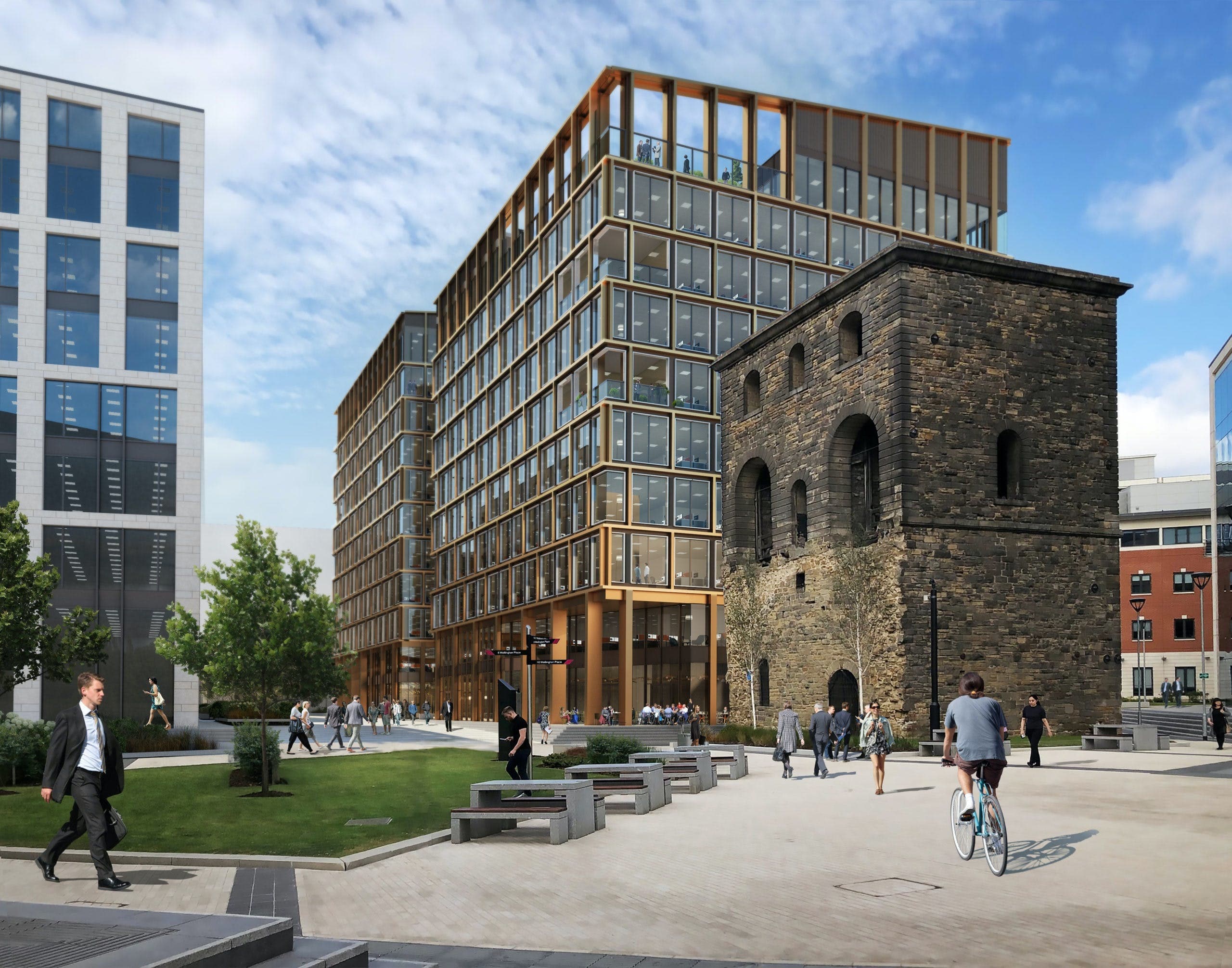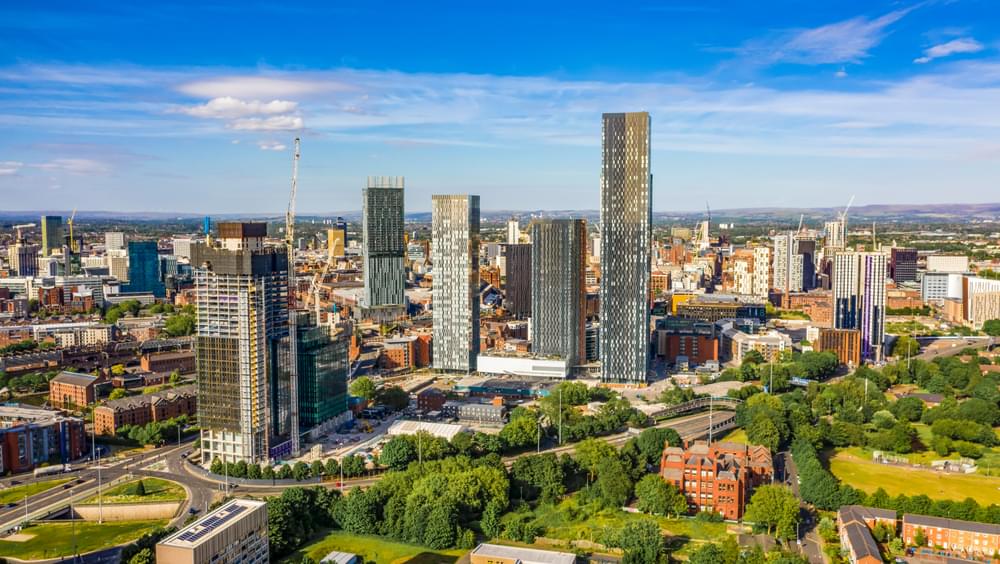Through G&T's partnership with New London Architecture (NLA) and as part of the recent Investment Summit held in the build up to the 2021 London Real Estate Forum (LREF), we invited NextGen members to give their insights on key market trends discussed by industry leaders at the summit.
The changes we are seeing now will significantly impact the next generation of built environment leaders at a critical point in their careers. The series of articles looks at how our cities could best adapt to fit an ever changing landscape and the future needs of their users exploring sustainability, modern methods of construction and more.
Offices in the North - What Could Change?
In this article, G&T project surveyor and NextGen champion Danielle Ford shares her thoughts on the North’s recovery plans post COVID-19 and discusses four ways in which the pandemic might shape the future of offices in the North.
The industry has been presented with the unique opportunity to reassess the way in which we work, encouraging new and flexible working practices in order to achieve optimal productivity by means of a carefully maintained work-life balance. But what does this mean for the future office in the North and how much has the pandemic affected this?
Hybrid Working – is it here to stay?
A key focus at the Investment Summit was the government’s levelling up strategy which aims to increase prosperity across various regions in the UK and rebalance London with the rest of the UK. For the North this means a clean, smart, innovative and people focused post pandemic recovery in which the office plays a huge role.
The pandemic has shown us that some office-based work can be successfully carried out from home. As a result more companies have been offering flexible working options and we are seeing increased breakout and collaboration spaces to make use of new conferencing technologies. With potentially a higher proportion of employees working from home some of the time, the requirements for desk space may be smaller in area, but greater for amenity provision, flexible meeting furniture and AV equipment. Businesses might therefore be spending more money per square foot on fit-outs as they adapt to more efficient and flexible ways of working.
Flexible working was already on the rise pre pandemic with a supposed 46% of law firms planning on reducing their office space in 2019 to allow for more remote working and 81% stating that technology is the top strategic priority to ensure they stay competitive1. Despite the technology, there is however still demand for office space as collaboration, connectivity and the sense of community are all vital for encouraging and retaining a diverse workforce.
Being one of the fastest-growing tech cities within Europe, overtaking Cambridge for the first time and now only second to London, Manchester is in a good position to adapt quickly and attract new business, further supporting the North’s future office market2.
Focus on Wellbeing
In a report released at the beginning of COVID-19, G&T’s sustainability consultant Richard Francis explored how the pandemic had focused attention on indoor environments and how these link to personal health3. As a result of this focus we have seen an increase in the demand for healthy office buildings not just in the North but across the UK throughout the past year.
Leading on from this and as discussed at the Investment Summit by city leaders, since going into lockdown northern regions have been focussing on rebuilding areas with a recognised need for more green and public spaces in urban regeneration plans. Greater Manchester for example is building the largest cycling and walking network outside London to support these plans, which will likely have a huge impact on the office as we know it.
With all this in mind we will likely see an increase in the popularity of relevant certification schemes for commercial buildings, such as WELL accreditation for offices and the use of schemes such as ‘Cycling Score,’ which rates the microbility friendliness of commercial and residential buildings based on an official set of standards. We might also see a larger provision of cycling, exercise, nutrition and mindfulness facilities for employees alongside more sustainable and modern methods of construction such as Cross Laminated Timber.
G&T is also providing Cost Management services on a number of office developments at Wellington Place in Leeds, which holds sustainability at the heart of its design. 11 & 12 Wellington Place, for example, will look to set a new benchmark in the region by delivering the most energy efficient office building in Leeds by reducing its reliance on fossil fuels and minimising energy consumption. The building is targeting BREEAM 'Outstanding' and EPC A. The lesson of COVID-19 is that buildings like these are now necessary to assure healthy working environments and long lasting businesses.

Focus on Sustainability
Aside from promoting productivity and enhancing employees’ wellbeing, healthy offices will be a necessity if Manchester is going to become net zero by 2038. At the Investment Summit Andy Burnham, Mayor of Greater Manchester shared how Manchester will be the first city to partner with an energy supplier to see how they can align investment priorities and make 2038 a realistic target.
However even before COVID-19, sustainability was rising up the agendas of developers as occupiers established that they will only pay premium rents for offices with distinguished environmental certifications. In Manchester for example, research by Savills shows that more than 76% of offices let above £30/per sq ft had a BREEAM rating of at least ‘Very Good’, rising to 100 per cent of buildings let above £35/per sq ft4.
In the same report from Savills it states that Landmark, a Grade A scheme developed by Barings in Manchester’s premier business district of St Peter’s Square, has secured the city’s current top rent of £38.50/per sq ft and boasts a BREEAM rating of ‘Excellent’ and an EPC rating of A4. Alongside this, the building includes many sustainable features such as electric car charging points and solar panels and was constructed using sustainably sourced timber. The Landmark honey bees have also recently moved into their new home in the rooftop beehives. G&T provided Cost Management and Project Management services on the development.
Another example of a best in class highly sustainable and efficient commercial office is 4 Angel Square in the new NOMA district in Manchester. G&T is providing Cost Management and Employers Agent services on the 11-storey 200,000 sq ft Grade A development, set to be the city’s first net zero mixed-use office space. The building is working towards a NABERS UK 5 star rating and BREEAM 'Outstanding.'

As discussed at the Investment Summit by city leaders, since going into lockdown northern regions have been focussing on rebuilding areas with a recognised need for more green and public spaces in urban regeneration plans. Greater Manchester is building the largest cycling and walking network outside London and will be the first city to partner with an energy supplier to see how they can align investment priorities and make 2038 a realistic target5.
With all this in mind we will likely see an increase in the popularity of relevant certification schemes for commercial buildings, such as WELL accreditation for offices and the use of schemes such as ‘Cycling Score,’ which rates the microbility friendliness of commercial and residential buildings based on an official set of standards. We might also see a larger provision of cycling facilities and more sustainable and modern methods of construction such as Cross Laminated Timber.
The Impact on “North Shoring”
Commercial viability for projects is crucial for cities in the North such as Leeds and Manchester. For this reason the northern regions which had benefitted from ‘north-shoring’ pre-COVID, may be hit harder than the capital by an extended economic downturn. Before the pandemic, Manchester was the UK’s premier growth city, with aspirations to make the city a greener and more desirable place to live and work attracting businesses and residents.
As living costs rise in London and the south, northern regions have become increasingly appealing for individuals looking to buy. Cities such as Manchester and Leeds could benefit hugely from the influx of people relocating however, it is unclear whether this growth will now be stunted due to the pandemic.
With the pandemic changing the economic and office landscape almost overnight, the future of commercial spaces in the North is still promising. It is expected that we will see definite changes in the future office, with increased hybrid working, smart technology and a focus on both healthy buildings and people. Such changes will need to be embraced in order to attract and retain the next generation of diverse property leaders that will go on to experience the full effects of the pandemic during a key time in their careers.
Find out more about our partnership: https://www.gardiner.com/newsroom/2019/lref-2019
Catch up on the Investment Summit webinars: https://www.lref.co.uk/2021-investment-summit/
Project Links:
Article Links:
Modern Methods of Construction
References:
[1] https://www.lawsociety.org.uk/en/topics/small-firms/office-space-stay-or-go
[2] https://www.investinmanchester...
[3] https://marketintel.gardiner.com/bulletins/future-health-of-buildings




